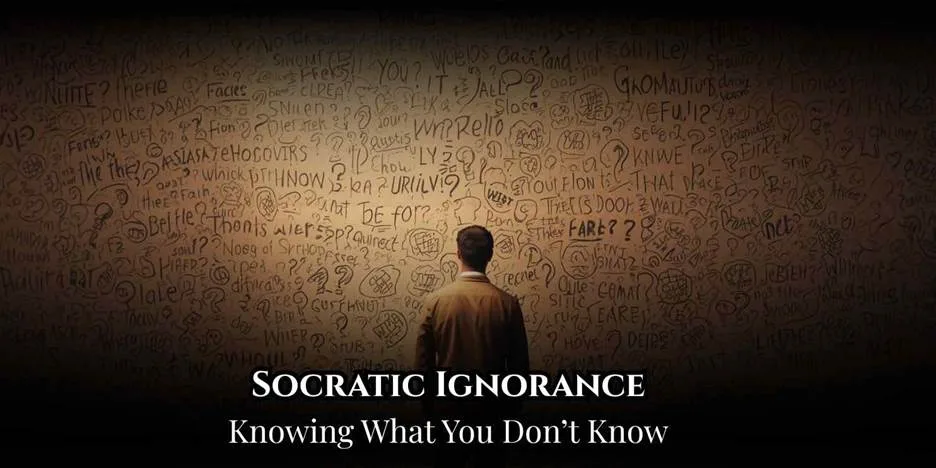Socratic ignorance is more than just a philosophical phrase; it’s a timeless mindset that reshapes how we learn, question, and grow. Introduced by the ancient Greek philosopher Socrates, this concept is rooted in the humble recognition of one’s own lack of knowledge. Rather than pretending to have all the answers, Socratic ignorance opens the door to critical thinking and genuine understanding. In this article, we’ll explore its definition and origins, uncover why it remains relevant today, examine its benefits and challenges, and look at real-world applications that highlight its enduring impact. By the end, you’ll see why acknowledging ignorance is not weakness but a crucial strength for personal and collective growth.

Understanding Socratic Ignorance and Its Origins
Definition and Philosophical Background
Socratic ignorance refers to the belief that acknowledging one’s ignorance is the first step toward wisdom. Socrates famously declared that he was wise because he knew that he knew nothing. This paradox highlights the importance of intellectual humility. By admitting his limitations, Socrates positioned himself as a perpetual learner, willing to question and explore rather than accept things at face value.
This concept is not about being unaware or uneducated. Instead, it represents a conscious, deliberate admission that human knowledge is always limited. By starting from this honest foundation, Socrates could challenge conventional wisdom and uncover deeper truths.
Historical Roots in Ancient Greece
In ancient Athens, Socrates became known for his unconventional method of dialogue. Rather than lecturing, he questioned politicians, poets, and craftsmen—people who were considered knowledgeable in their fields. Through his probing questions, he revealed contradictions and gaps in their understanding, demonstrating that true knowledge often begins with honest self-reflection.
His approach came at a time when public debate and rhetoric dominated intellectual life. Many people spoke with confidence, but their claims often lacked depth. Socratic ignorance disrupted this culture, emphasizing inquiry over appearance. This method, later formalized as the Socratic Method, became a cornerstone of Western philosophical and educational traditions, influencing thinkers from Plato to modern educators.
Why Socratic Ignorance Matters in Modern Times
A Foundation for Lifelong Learning
Today, Socratic ignorance is more relevant than ever. In an era of information overload, being aware of what we don’t know is essential. With social media, AI tools, and endless online content, it’s easy to confuse exposure to information with understanding. By adopting the Socratic mindset, individuals can:
•Seek evidence before forming opinions
•Ask deeper questions instead of accepting surface-level answers
•Remain open to new perspectives and evolving knowledge
•Build resilience against misinformation and cognitive bias
This approach nurtures curiosity and continuous learning, making it invaluable in classrooms, workplaces, and personal growth.
Strengthening Critical Thinking Skills
Critical thinking thrives when people admit their limitations. Socratic ignorance encourages skepticism, thoughtful dialogue, and evidence-based reasoning. Instead of rushing to judgment, individuals take time to analyze claims, evaluate sources, and refine their perspectives. This intellectual humility creates space for genuine understanding, reducing overconfidence and improving decision-making.
Benefits of Embracing Socratic Ignorance
1. Promotes Genuine Understanding
Rather than relying on superficial knowledge, this approach pushes individuals to dig deeper. It helps differentiate between what we truly know and what we merely assume, creating a clearer foundation for further learning.
2. Enhances Communication and Collaboration
When people acknowledge their ignorance, discussions become more honest and constructive. Teams can work collaboratively, valuing diverse viewpoints rather than competing to appear right. This leads to better problem-solving and more innovative ideas.
3. Encourages Intellectual Growth
Socratic ignorance fosters curiosity. By recognizing gaps in understanding, individuals are motivated to seek out new information, engage in meaningful inquiry, and develop more sophisticated frameworks of thought.
4. Builds Resilience Against Misinformation
In a digital age where misinformation spreads rapidly, admitting ignorance can act as a safeguard. Instead of pretending to know, individuals can pause, verify, and respond thoughtfully. This protects personal credibility and strengthens public discourse.
Challenges and Misunderstandings About Socratic Ignorance
Common Misconceptions
Despite its strengths, Socratic ignorance is often misunderstood. Some see it as a sign of indecisiveness or weakness. In reality, it represents intellectual strength. Admitting ignorance does not mean lacking knowledge altogether; it means recognizing the limits of what we currently know and maintaining openness to growth.
Emotional and Social Barriers
In many settings, especially competitive environments, admitting ignorance can feel uncomfortable. People fear losing status, credibility, or authority. This emotional barrier can prevent honest conversations and hinder learning. Overcoming it requires a cultural shift that values questions as much as answers.
Real-World Applications of Socratic Ignorance
Education and Teaching
Teachers who embrace Socratic ignorance foster classrooms that value questioning over memorization. Instead of presenting themselves as the ultimate source of truth, they model inquiry and encourage students to explore multiple viewpoints. This approach develops critical thinkers rather than passive learners.
Scientific Research
Science thrives on acknowledging uncertainty. Researchers constantly revise theories, question assumptions, and embrace doubt as part of discovery. For example, breakthroughs in medicine and physics often arise from questioning accepted truths and admitting that existing explanations may be incomplete.
Leadership and Decision-Making
Leaders who practice Socratic ignorance create environments where feedback is valued, and diverse perspectives are welcomed. By openly acknowledging their limitations, they foster trust and make better-informed decisions. This leadership style is particularly valuable in complex, fast-changing industries where no single person can know everything.
Personal Development
On an individual level, embracing Socratic ignorance can transform relationships and self-growth. It helps people listen more attentively, avoid snap judgments, and approach challenges with curiosity instead of defensiveness.
Conclusion: The Timeless Wisdom of Socratic Ignorance
Socratic ignorance teaches us that wisdom begins with acknowledging our limitations. In a world that often rewards quick answers and confident appearances, this ancient principle invites us to slow down, question deeply, and remain humble learners. Whether in education, leadership, research, or personal life, its relevance continues to grow. By embracing Socratic ignorance, we unlock pathways to genuine understanding, stronger critical thinking, and lifelong intellectual growth. Explore this mindset further to transform how you learn and engage with the world.
